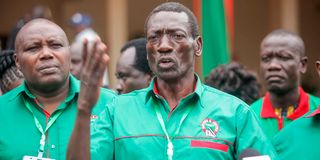Knut seeks review of ‘dictatorial’ policies

Knut Secretary-General Collins Oyuu addresses journalists at the Citam Auditorium in Kisumu County yesterday. Mr Oyuu said teachers will come up with proposals on what he termed dictatorial policies, among other issues affecting the education sector, at the ongoing 62nd Annual Delegates Conference of the union.
The Kenya National Union of Teachers (Knut) is today expected to make major resolutions on “dictatorial policies” in the education sector.
Other major resolutions will be on the ruling Kenya Kwanza Alliance’s education charter and what it promises teachers, such as the funding of education, improvement of infrastructure, and demands that teachers’ disciplinary be handled by the Teachers’ Appeals Tribunal.
The resolutions will be made at the close of the 62nd Kenya National Union of Teachers (Knut) annual delegates conference currently going on in Kisumu.
Knut Secretary-General Collins Oyuu said teachers expect major education reviews as President William Ruto’s government takes shape. He stated that they will be pushing for a review of the education system to accommodate stakeholders’ views.
“We will be reviewing some of the policies that have posed danger to the education sector. Most of these policies are dictatorial in nature, were done without proper consultation with stakeholders and are no longer tenable,” said Mr Oyuu.
He added: “We will reflect and come up with proposals and clear strategies for better service delivery to the teachers at all levels as envisioned in the Knut constitution and in our service charter,” said Mr Oyuu.
Other issues that are likely to dominate the conference include renegotiation of the 2021-2025 Collective Bargaining Agreement (CBA), reversing the delocalisation policy and promotion of teachers, which was shifted from depending on academic qualifications to appraisals.
“We want promotions based on academic qualifications brought back so as to benefit those teachers who invested in the same by taking loans,” said Mr Oyuu.
On the CBA, Mr Oyuu said teachers were unhappy that it does not have monetary benefits. He indicated that they have commenced structured talks with the Teachers Service Commission (TSC) to have this addressed.
The union boss defended the proposal of a 60 per cent salary increment across board is based on the fact that teachers have not been compensated for the rise in the cost of living since 2017.
“It is only fair to extrapolate the annual rate of inflation over the six years. This should be one of the resolutions of the delegates,” said Mr Oyuu.
The conference also comes at a time when teachers are pushing the union to fight for those who have attained higher qualifications – diploma and degree – to be promoted to teach in junior secondary schools.
After the government ended the delocalisation policy, Mr Oyu said reversing the transfers has becomes a major issue.
“Many may not know that there is a dilemma over what to do with teachers who have expressed interest to go back to their counties since the positions they held there have since been filled,” said Mr Oyuu.
The union further appreciated the move by the government to employ more teachers.
“The government through the Teachers Service Commission has already advertised 35,550 vacancies in both primary and secondary schools,” said Mr Oyuu.
The union also wants TSC to allow it to handle disciplinary cases through the Teachers Appeals Tribunal.
“The tribunal was abolished at some point for reasons not known to us. As it stands, TSC accuses teachers, hears the cases and determines their fate. Initially, we used to sit at the commission, more so when a teacher has been dismissed and he or she appeals,” said Mr Oyuu.




